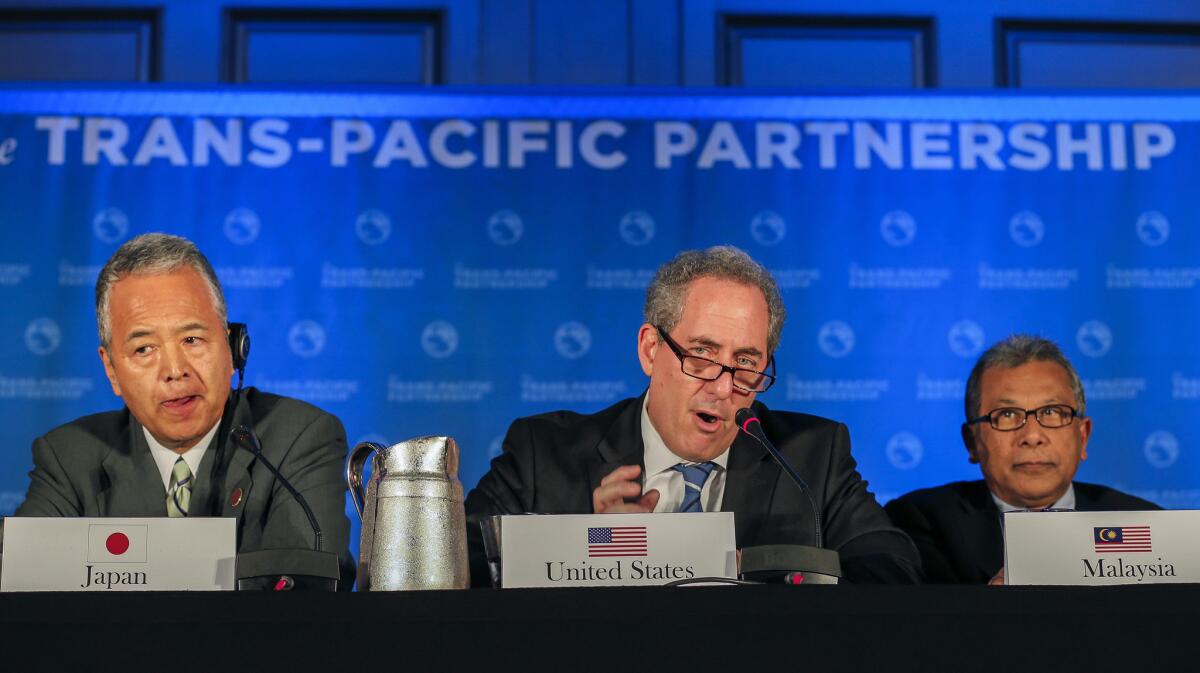Most important points of the Trans-Pacific Partnership trade deal and how they’ll affect California

U.S. Trade Representative Michael Froman, center, is flanked by Japan’s Trade Minister Akira Amari, left, and Malaysia’s Trade Minister Mustapa Mohamed as he speaks after an agreement was reached in the Trans-Pacific Partnership.
- Share via
Dairy trade will free up among TPP nations, despite initial political difficulty of reaching compromise
Restrictions on dairy markets, an industry vigorously protected by Canada and several other countries, became one of three major sticking points in negotiations.
Under the deal, the U.S. has agreed to allow more imports of sensitive dairy goods, which was a top priority for New Zealand. Japan and Canada also made concessions to open up their dairy markets.
The changes could be a boon to dairy farmers in California, the largest dairy-producing state in the United States.
The details of the dairy provisions remain unclear, but industry groups so far seem lukewarm on the agreement.
"Based on the little information we have heard so far, it appears that the dairy agreement provisions are better than" what had been discussed in recent weeks, said Jaime Castaneda, senior vice president of the National Milk Producers Federation.
Domestic political considerations had complicated the search for a compromise on the matter. Canada’s ruling Conservative Party had been reluctant to open its dairy market, particularly with national elections looming, prompting U.S. resistance to the idea. Australia and New Zealand, a major dairy exporter, were seeking much more leverage in the U.S. dairy market.
Deal will impose shorter patents for certain complex drugs
Another thorny issue that had held up negotiations, the length of patents in the multibillion-dollar biologics drug market, became a majority priority for the U.S.
Under U.S. law, biologic drug makers have a 12-year exclusive right to the research they develop on their products’ safety and effectiveness. Even with the recent entrance of “biosimilar” drugs to the market, any company wishing to get a similar drug approved has to submit its own safety and efficacy studies. Most other countries in the partnership have laws that allow drug exclusivity for five years or less.
U.S. trade officials had wanted eight years of exclusivity for new drugs before the release of data could lead to generic substitutes. The trade deal provides for a five-year minimum period of exclusivity but leaves open the possibility that the U.S. could seek protections for longer time periods.
Pharmaceutical firms in the U.S. had argued that longer patents were needed to preserve innovation, given the cost of developing biotech drugs. Consumer and doctor groups pushed for shorter terms that they said were critical for patients to have timely access to affordable medicines.
PhRMA, which represents the biggest pharmaceutical companies in the country, said in a statement Monday that it was “disappointed” in the deal.
Changes could also have a major effect on California, particularly in biotech-heavy regions like the Bay Area and San Diego. California’s biomedical industry was responsible for 270,000 jobs and $101 billion in 2013, according to the California Biotechnology Foundation. Exports from California’s biomedical industry totaled $22.2 billion that year, the group estimated.
Freer flow of data and e-commerce could be a boon to Silicon Valley
The trade deal will promote the free flow of data across borders, according to the White House, and ban the practice of requiring technology companies to place data, servers or other facilities in a country in order to gain access to its market.
The pact also eliminates taxes on U.S. exports of information and communication technology products, which could be as high as 35% in some places. U.S. exports in the information and communication technology sector amounted to $36 billion in 2014.
The loosening of restrictions on data and e-commerce could have a profound effect in California, where Silicon Valley continues to be a global industry leader.
Other major points of the deal include:
- Changes to intellectual property and copyright rules within the trade zone
- Loosening of tariffs on automobile imports
- Expanded labor protections, such as bans against child and forced labor, which the White House says are fully enforceable and the strictest of any trade agreement in history
- Environmental standards that requires a commitment to fight wildlife trafficking, illegal logging, and conservation of sharks, rhinos, elephants, and other species
For more breaking news, follow @cmaiduc and @dleelatimes
Sign up for Essential California
The most important California stories and recommendations in your inbox every morning.
You may occasionally receive promotional content from the Los Angeles Times.









